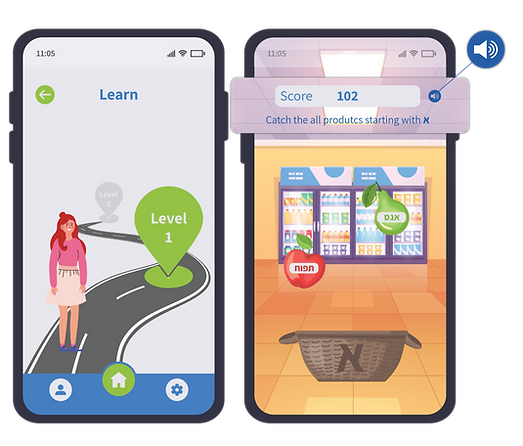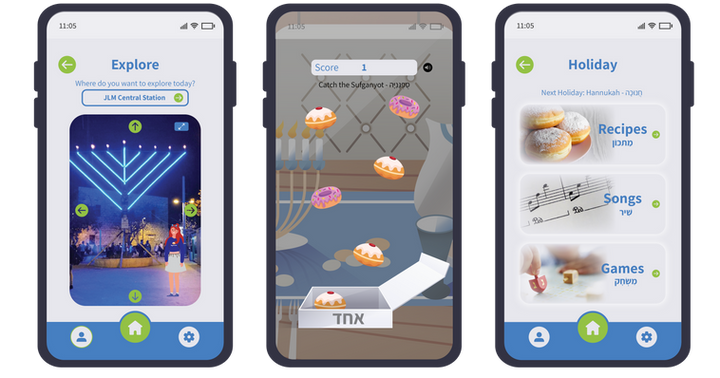
OliHelp is an application designed for young people aged 9-16 to help them adapt and prepare for Aliyah (immigration) to Israel.

Project Length: 1 Academic Semester
Background
In my "Product Development" class, we were asked to develop a project related to "support." I chose to research the challenges of making Aliyah, drawing from my firsthand experiences. Through my research, I discovered that children, especially those aged 9 and older, face unique challenges when making Aliyah:
-
At this age, children become more self-aware and may find it harder to adapt to new environments.
-
It's recommended that parents prepare their children in advance to help them cope with culture shock.
-
Engaging in cultural activities can make the transition smoother and more enjoyable.
Based on these findings, I focused on creating a solution to help young newcomers have a smoother Aliyah experience.
The Problem
I conducted a survey and distributed it to various Aliyah groups along with anyone I knew who had made Aliyah. I divided the survey into two parts: one for individuals who made Aliyah between the ages of 9-16 and another for parents who made Aliyah with children in that age range.
The three main issues children in this age group face are:
-
Language barriers
-
Culture shock
-
Unfamiliarity with the new place, especially for families who may not have the means to visit the country before making Aliyah.
The Goal
Design an efficient and user-friendly experience to help kids aged 9-16 have a smoother Aliyah experience.
The Application

Home Screen: The avatar is situated in a space with many available option buttons: Explore, Learn, Chat, FAQ, Tasks, and Holiday Specials. This screen is designed to be the avatar’s personal space, which users can customize according to their preferences.
Profile Screen: This screen allows users to view their avatar, track their level progress in the learning section, see the amount of 'money' they have, view a countdown to their Aliyah date, and change their avatar's emotion to reflect how they're feeling. It functions like a personal diary, providing a space for users to express themselves within the app.

Explore Screen: The Explore screen is one of the main features of the app. It allows users to explore Israel and learn about their chosen city or any city they are interested in. This feature is designed for people who wish they could visit the country before making the big move. The Explore feature will be integrated with Google Maps.

Learning Screens: On the Learn screens, the user's avatar walks down a road, representing the user's current level. The Learn feature consists of various mini-games that the user can play while learning. There are different levels, starting with Level 1, which covers the basics, and each subsequent level presents more challenging mini-games.
In Level 1, users learn the alphabet and numbers. For example, on this screen, you might see a basket labeled with the letter Aleph, and when the user catches a product that starts with that letter, a voice repeats the letter and the product, helping the user learn through both visual and auditory cues.

Chat Screen: The chat feature is AI-powered and is designed to answer any questions the user may have, provide comfort, or offer general support. When the user changes their mood to 'upset,' the app will connect them to the chat for a conversation to offer appropriate comfort. In the top corner, there is an option to switch the conversation to Hebrew for the user to practice.

Tasks Screen: The Tasks encourage players to explore the app's games and features and to keep coming back over time. Players earn 'Shekels' to customize their space and character.
In the example above, a user completes a task by searching for 'Avi' in the Explore section and purchasing something from him, which was their task for the day. Additionally, when a user sees a character in the Explore section, they have the ability to practice a conversation with him in Hebrew if they want to.

Holiday Versions: I designed the application to adapt to the approaching holidays. The mini-games will become holiday-themed, and the Explore section will show places in Israel and how they look during those specific holidays. For example, in the central bus station in Jerusalem, there is always a big Menorah on Hanukkah for everyone to light the candles together, which is very special.
Additionally, the 'Holiday' button will take the user to a page that teaches different games, recipes, and songs related to the holiday. There is also festive merchandise available for the avatar, allowing the user to dress them up in a more festive way. This adds variation to the experience and teaches the users about the different holidays.

Something very unique and special in Israel are days like Remembrance Day. The avatar will receive a sticker resembling the one that people in the country receive on that day, and the app will explain what this day is about and what the sticker means. The Explore section will also show what the country looks like during a siren, as it’s something you don't see everywhere: during a siren, many stand outside their cars. It’s a special aspect of Israeli culture.
The Colors:
For the application’s colors, I chose green and blue. Green signifies learning and growth, while blue represents calmness, trust, and the Israeli flag.


